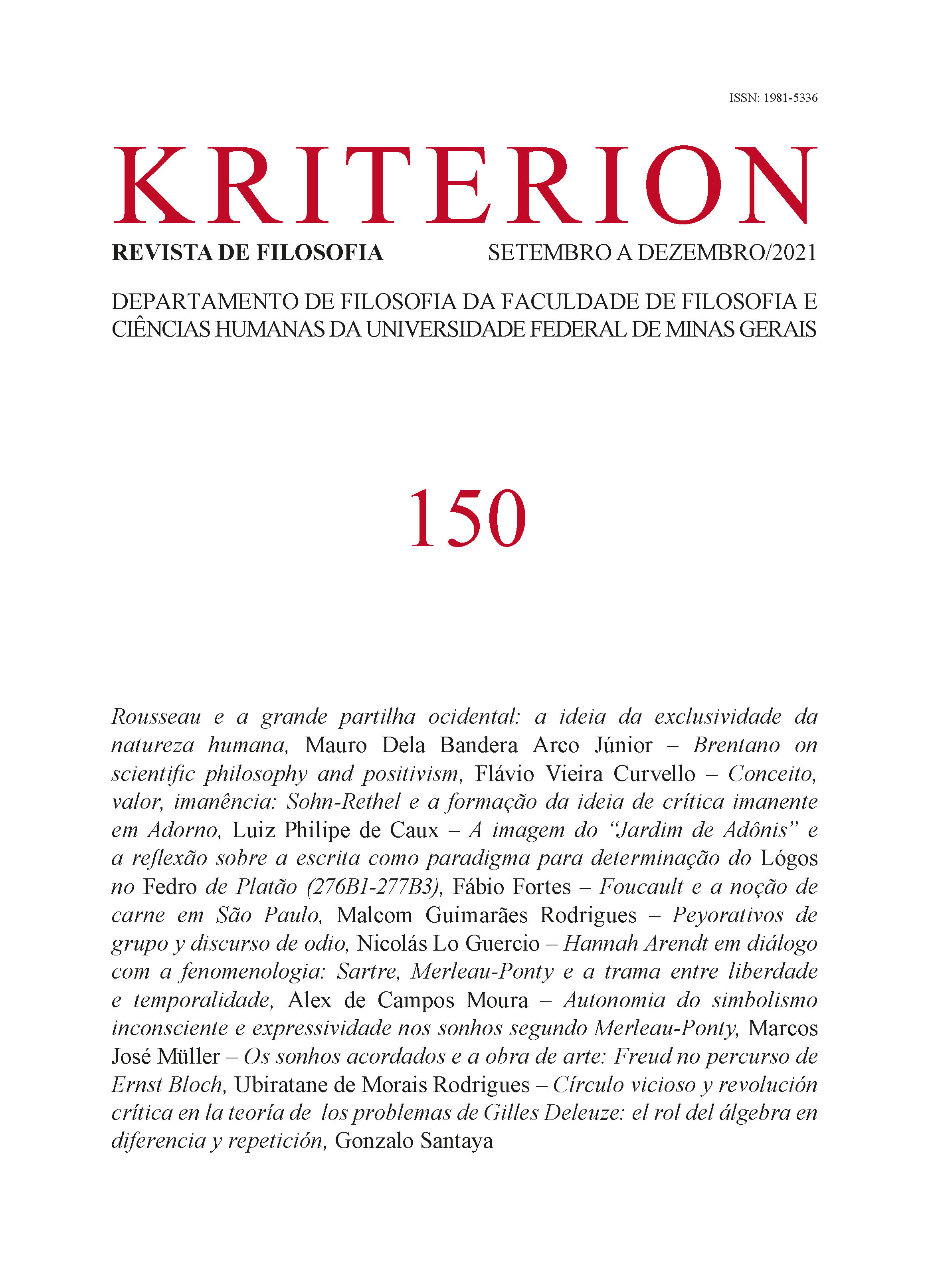VICIOUS CIRCLE AND CRITICAL REVOLUTION IN GILLES DELEUZE’S THEORY OF PROBLEMS
the Role of Algebra in Deleuze's Transcendental Philosophy
Keywords:
Deleuze, Vuillemin, algebra, problemAbstract
This paper aims to shed light on the concept of “problem” developed by Gilles Deleuze in Difference and repetition by analyzing the presence in that book of the Norwegian algebraist Niels Henrik Abel. Deleuze attributes to this mathematician having invented a method that breaks the “vicious circle” which consists in tracing the problems to the image and similarity of
the solutions. We will argue that Deleuze’s interpretation is based on Jules Vuillemin’s work La philosophie de l’algèbre, which draws a parallelism between Lagrange’s algebra and Fichte’s transcendental philosophy to show a common flaw in both their methods. We will begin by characterizing the aforementioned “vicious circle”, and then go through the general characteristics of the algebraic problem and its parallel with critical philosophy, in order to show, finally, the main features that Deleuze seeks to highlight in the abelian method –presented by Vuillemin as the overcoming of Lagrange (and, consequently, of Fichte).
Downloads
References
ABADI, D. “El aporte algebraico de Galois a la teoría deleuziana de los problemas”. En: “Agora: Papeles de filosofía”, Vol. 34, n. 2, 2015, pp. 25-43. https://doi.org/10.15304/ag.34.2.2108
ABEL, N. H. (1828) “Sur la résolution algébrique des équations”. “Œuvres Complètes de N. H. Abel”, T. II. Christiania: Grundähl, 1839.
CANAVERA, J. “Notas sobre la crítica de la imagen dogmática en la obra de Gilles Deleuze”. En: “Revista de Filosofía”. Vol. 40, n. 2, 2015, pp. 83-108. http://dx.doi.org/10.5209/rev_RESF.2015.v40.n2.50057
CLISBY, D., “¿El dualismo secreto de Deleuze? Versiones en disputa sobre la relación entre lo virtual y lo actual”. Traducción española de Pablo Pachilla. En: “Ideas. Revista de filosofía moderna y contemporánea”, n. 4, 2016, pp. 120-148. http://revistaideas.com.ar/ideas04nota05/
DELEUZE, G. “Différence et répétition”. París: PUF, 1968.
________, “Exasperación de la filosofía: El Leibniz de Deleuze”. Traducción española del equipo editorial Cactus. Buenos Aires: Cactus, 2006.
________, y GUATTARI, F. “Mille Plateaux”. París: Les Éditions de Minuit, 1980.
DOSSE, F. “Gilles Deleuze et Félix Guattari. Biographie croisée”. París: Editions La Découverte, 2007.
DUFFY, S. “Deleuze and the History of Mathematics: In Defense of the New”. Londres/Nueva York: Bloomsbury, 2013.
FERREYRA, J. “Fichte o Deleuze, ¿quién es el dogmático?”. En: “Valenciana”, vol. 11, n. 21, ene./jun. 2018. http://dx.doi.org/10.15174/rv.v0i21.326
KLINE, M. (1972) “Historia del pensamiento matemático desde la antigüedad hasta nuestros días”. Traducción española de Mariano Martínez, Juan Tarrés y Alfonso Casal. Madrid: Alianza, 1992.
KRETSCHEL, V. “Lautman y Deleuze: Idea, problema, estructura y realidad”. En: Ferreyra, J., y Soich, M. “Deleuze y las fuentes de su filosofía”. Buenos Aires: La Almohada, 2014, pp. 28-36.
LAGRANGE, J.-L. (1771). “Réflexions sur la résolution algébrique des équations”. En: “Œuvres complètes de Lagrange”, T. III. París: Gauthier-Villars, 1869, pp. 205-421.
LAUTMAN, A. (1771). “Ensayos sobre la dialéctica, estructura y unidad de las matemáticas modernas”. Traducción española de Fernando Zalamea. Bogotá: Universidad Nacional de Colombia, 2011.
SANTAYA, G., “El procedimiento de adjunción de Évariste Galois y su presencia en
la ontología deleuziana”. In: J. Ferreyra y M. Soich (eds.), 2014, pp. 37-47.
______. “El cálculo trascendental. Gilles Deleuze y el cálculo diferencial: ontología e historia”. Buenos Aires: RAGIF Ediciones, 2017.
VUILLEMIN, J. “La philosophie de l’algèbre”. París: PUF, 1962.
Downloads
Published
How to Cite
Issue
Section
License
Copyright (c) 2021 Revista Kriterion

This work is licensed under a Creative Commons Attribution 4.0 International License.










